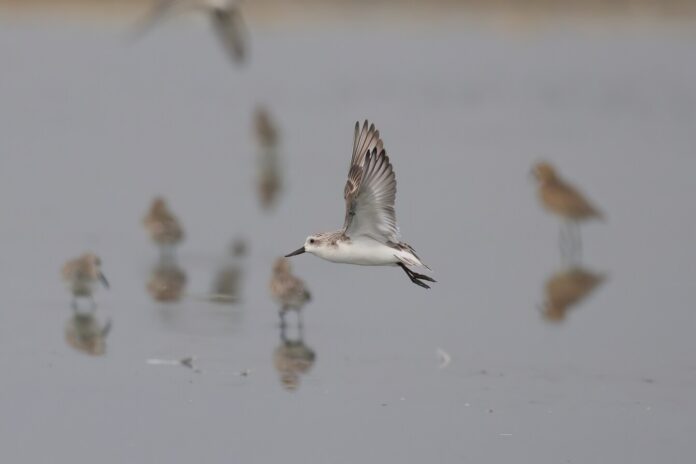Well folks, we’ve got some not-so-fun news for you. The nilled sandpiper, a bird that loves to fly around East Asia, has officially been grounded. Why? Because they can no longer make it to their Russian nesting grounds. Bummer, right?
Now, Russia may be huge, but it’s also key to maintaining Earth’s biodiversity. In fact, it’s got more remaining wilderness than any other country in the world. Plus, the forest acreage is massive and vital for keeping carbon out of the atmosphere. Unfortunately, the loss of knowledge of polar species is coming at a crucial time in the Arctic, a region that’s warming faster than your morning coffee.
According to Eduardo Gallo-Cajiao, a postdoctoral fellow who studies global governance at the University of Washington, global cooperation on wildlife conservation has grown steadily since the ‘70s. But now, Russia’s withdrawal from the international stage represents “the first time that we have a very clear step back in terms of biodiversity conservation.” Yikes, Russia, we thought you were cool.
Okay, we’re about to give you a history lesson that will knock your socks off. Even during the Cold War, the Soviet Union and the United States could agree on one thing: the importance of protecting polar bears. In ‘73, they signed an agreement with three other Arctic countries to stop the rampant hunting of polar bears, who often crossed borders in search of seals to munch on.
What happened after the fall of the Soviet Union in the ‘90s? Russia and the US doubled down on their cooperation and created a bilateral agreement in 2000 to manage a polar bear population that migrates between western Alaska and eastern Russia. Pretty cool, huh? But now, climate change is thinning the sea ice where researchers used to go to study the bears. So, they turned to Wrangel Island in Russia. Some of the survey work was even featured on the BBC series “Frozen Planet II.” But, without US government support after Russia invaded Ukraine in February 2022, that research has come to a screeching halt.
Can we all agree that “a fat bear is a happy bear”? We thought so. But, without the ability to sedate bears to put GPS trackers on them, draw their blood or measure their weight, we won’t know if they’re gaining or losing weight. Let’s get this research moving again!
Now, early on in the war, the White House issued guidance that limited federal scientists’ interactions with Russian researchers. The communication clampdown makes it harder for government researchers to continue their work. For example, in late October, the US Geological Survey observed via satellite a massive group of Pacific walruses huddled on Cape Serdtse-Kamen in eastern Russia. But, to gauge the actual number of walruses on the beach, they need on-the-ground observations from Russia. Sadly, the US scientists can’t talk to their Russian counterparts. It’s like having a phone but not being able to call your friend. How frustrating!
Economic sanctions imposed by Western nations are challenging conservation work in Russia, as well. For years, wildlife managers put clutches of spoon-billed sandpiper eggs laid in eastern Russia into incubators. With only about 200 to 400 adults left, each egg is precious. After they hatch, the team pens the chicks to protect them from gulls, squirrels and other predators before release. But, now the incubation work is on pause due to a lack of money. Russia itself never contributed much to the conservation program, and most funds have been provided by Western European countries and China. But even Chinese banks are unable to transfer the funds. Don’t they know that these birds are egg-xtremely important?
The World Wildlife Fund has been working in Russia since 1988, and they helped establish Eurasia’s largest nature reserve, which is a 10-million-acre area full of Arctic foxes and musk oxen, known as the Great Arctic State Nature Reserve. Unfortunately, last month, the Russian government declared the group’s office there a “foreign agent,” a status they use to discredit opponents. But, the WWF International says that its Russian office is still operating and is “fully governed and managed by Russian citizens.” Phew, at least there’s some good news.
There are still many people who believe in protecting Russia’s wildlife, despite all these setbacks. Dale Miquelle, an American big-cat researcher at the Wildlife Conservation Society, is one of them. He continues to work with Russians on camera-trap monitoring of the Amur leopard. At the start of the 21st century, the cat was on the verge of extinction, with only 35 to 40 remaining in the wild. But, after the Russian government designated protected areas, the population tripled. Talk about an amazing success story! However, Miquelle has missed a major convention on tiger conservation in Russia because it’s just too risky for him to be there. And, let’s not forget, his wife was able to join him in Montana, but he hasn’t been back since. It’s a very tough position to be in, folks.
We know, we know. Our sense of humor couldn’t fix everything, but we hope we at least made you chuckle a bit.
Serious News: washingtonpost

